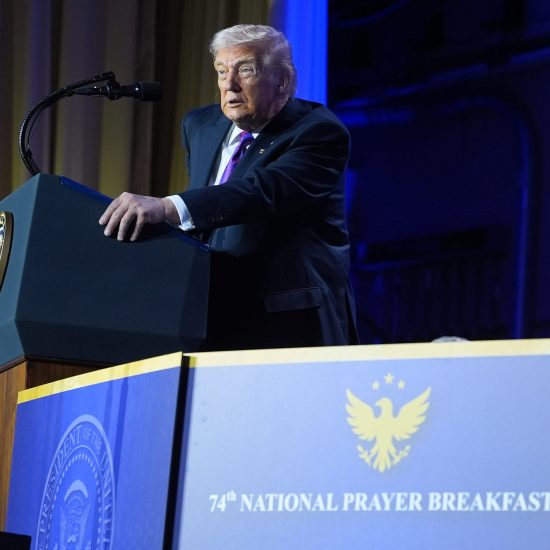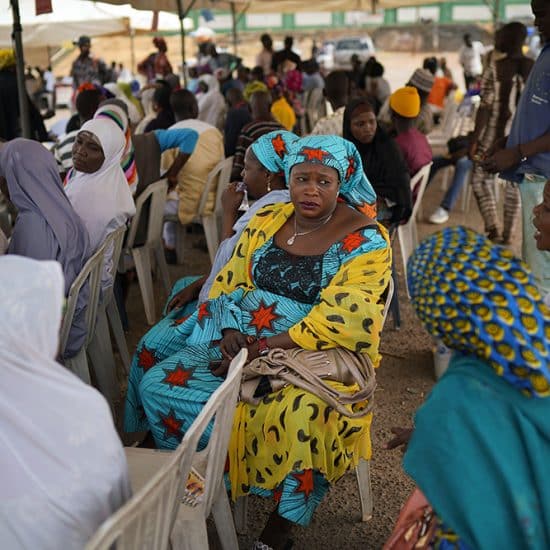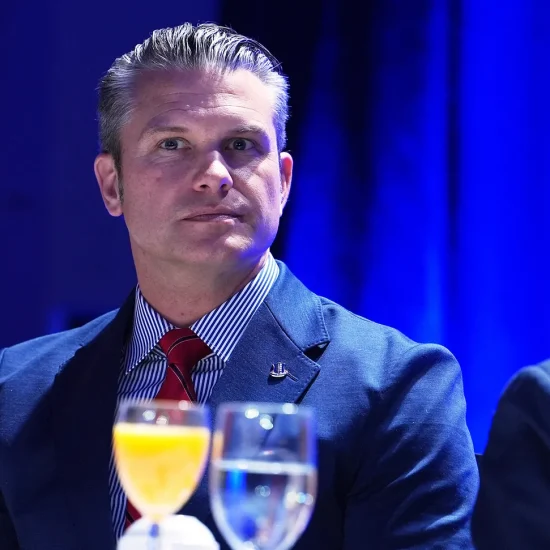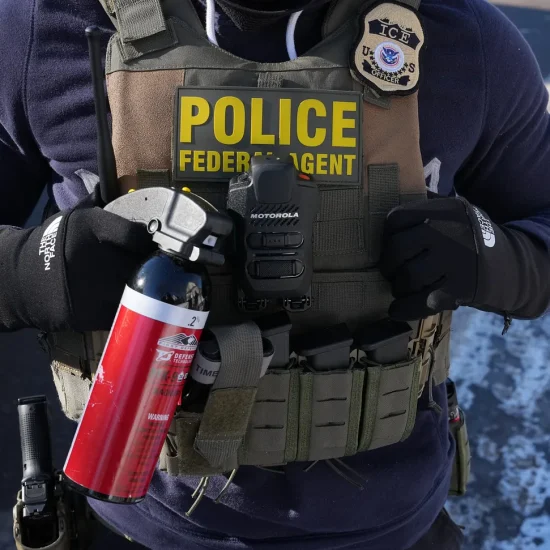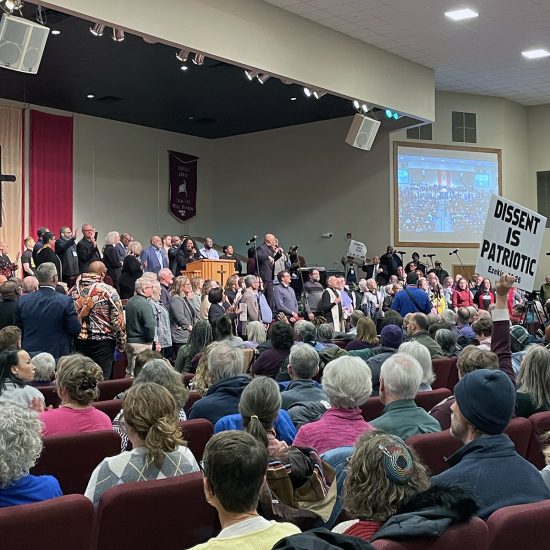
(openDemocracy) — The evening began with music performed by a choir of unmasked singers. Then Byron Foxx, an evangelist with the bellowing voice of a southern preacher, took the stage and presided over what he called a “God and country” meeting. The event included hymns, prayers, and scripture, but its speakers’ rhetoric was more typical of political rallies.
While there is no evidence that the individuals who spoke at this and similar events acted illegally, the churches and nonprofits that organized them are legally barred from participating in partisan politics. Those who spoke from the pulpit, framed by a giant US flag covering a cross, spoke about “spiritual warfare” and the need to “maximize the Christian vote.”
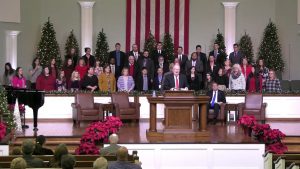
Screengrab of a Dec. 15, 2020 religious-political event at Canaan Baptist Church in Covington, Georgia.
None of the speakers explicitly endorsed specific candidates, but they made it clear which party they opposed (Democratic), and which they preferred (Republican): “They have control of the House. They have control of the White House. If they get control of the Senate they can do anything they want,” former Republican Congressman Bob McEwen remarked during the event on 15 December – just weeks before Georgia’s critical vote.
In the end, events like this one did not succeed in pushing Republicans over the line: the Democrats subsequently won both of Georgia’s Senate seats and now control the US Congress. But experts say that there are wider issues surfaced by the tightly-fought race which still need to be addressed.
The 15 December meeting at Canaan Baptist Church, in the small town of Covington about a 30 minute drive southeast of Georgia’s capital, Atlanta, is just one of several examples identified by openDemocracy of churches and other tax-exempt non-profit groups participating in partisan political activities in the weeks leading up to the US Senate runoff elections in Georgia. openDemocracy reviewed more than ten hours of video footage posted on social media from pre-election events at four churches including the one in Covington, and analyzed ‘voter guides’ from half a dozen groups.
Ellen Aprill, professor of tax law at Loyola Marymount University Law School in California, said the Covington event broke the rules.
“Saying you are not telling [people] how to vote does not immunize the event, to use a verb much in all our minds,” she said. “Saying that people need to be sure Democrats do not control the Senate is a violation of the campaign intervention prohibition.”
US federal law allows tax-exempt 501(c)(3) non-profit organizations, including churches that are registered like this, to engage in nonpartisan voter education and registration activities – but it forbids them from engaging in partisan politics such as endorsing or opposing specific political candidates. These groups cannot, says the IRS, participate in “activities with evidence of bias that would favor one candidate over another; oppose a candidate in some manner; or have the effect of favoring a candidate or group.”
Brendan Fischer, director of the Federal Reform Program at the non-profit Campaign Legal Center, said that “in years past, the Internal Revenue Service (IRS) may have viewed the [Covington event] as crossing a legal line,” but under Donald Trump’s administration it adopted a “non-enforcement posture.” Thus, he said such groups “may feel emboldened to push the legal envelope.”
Conservative politicians and lobby groups have long opposed the IRS rules. From 2008-2016, more than 2,000 Evangelical Christian clergy “deliberately violated” them in protest, the Washington Post said. Only one of these people had been audited, it added, and none had been sanctioned.
There was also a 10% increase in the number of Protestant pastors who personally endorsed a political candidate in the 2020 election compared to 2016, according to a survey by LifeWay Research, the research arm of the Southern Baptist Convention, the largest Protestant denomination in the U.S.
In Georgia, several Christian conservative groups reportedly spent millions of dollars on efforts to increase voter turnout and support for Republican candidates in the Georgia Senate runoffs. Prominent pastors in Georgia also previously endorsed Donald Trump, including Jentezen Franklin, senior pastor of multi-campus megachurch Free Chapel and member of the 2016 Trump campaign evangelical advisory board.
‘A Christian Nationalist Meeting’
The meeting in Covington, Georgia, concluded in the same way that church services often do – with multiple prayers, including one that said: “Dear Lord, help these people as they are scared that Joe Biden is going to…win.” Other closing prayers cast the runoff elections as “spiritual warfare” and included a plea for God to “put your candidate in office.”
Billy Ingram, senior pastor at the Canaan Baptist Church where the event was held, previously attended a Trump rally in October, and said the 2020 vote was the “most important election in our lifetime.” On social media afterwards, he repeated unfounded allegations that the 2020 election was ‘stolen,’ and retweeted an article calling for Trump to direct the US military to intervene in the election.
Andrew Seidel, a constitutional attorney at the non-profit Freedom From Religion Foundation in Madison, Wisconsin, also reviewed video footage – posted on the church’s social media pages – of the event in Covington and described it as a “Christian Nationalist meeting.”
“They made it clear,” he added, “when they said at the beginning that ‘this is a God and country meeting,’ that they intended to mix politics and preaching.”
The FFRF has previously challenged allegedly partisan activities of churches and pastors, including in Florida and Texas, with complaints to the IRS. It is unclear if any action was taken in response, and the IRS did not respond to openDemocracy’s questions about activities in the 2019-20 election cycle.
At the Covington event, the former Republican congressman Bob McEwen also repeated unfounded allegations about voter fraud in the 2020 election. McEwen is deeply connected to powerful right-wing and religious conservative movements. He was appointed by Trump, for example, to serve on the President’s Advisory 1776 Commission to promote ‘patriotic education.’ He also has long-standing ties to the secretive, Christian conservative Fellowship Foundation, also known as ‘The Family.’
‘Dishonestly Leading Questions’
Another speaker at the Covington event was Paul Smith, founder of the Christian conservative group Citizen Impact, a Georgia-based 501(c)(3) non-profit that is legally barred from participating in partisan political activities. From the pulpit, he promoted a ‘voter guide’ and asked audience members to help distribute it.
“We’re not even here to tell you who to vote for,” he said, while adding: “We do have this voter guide that might help you with that.”
The guide presents a side-by-side comparison of the voting records of Georgia’s Democrat and Republican senate candidates – on just ten issues, including “abortion on demand,” defunding the pro-choice group Planned Parenthood, the border wall, the confirmation of Amy Coney Barrett as Supreme Court justice this year, and the impeachment of Donald Trump.
Under the law, 501(c)(3) groups are allowed to produce and distribute voter guides, and other voter education materials, but these must be created in a “nonpartisan manner,” explained Fischer at the Campaign Legal Center.
“Similarly, charities and churches may discuss political issues at public forums, but may not cross the line into electoral advocacy,” Fischer added.
openDemocracy shared several voter guides produced for the Georgia Senate runoff elections by Christian conservative groups with tax experts.
Aprill at Loyola Marymount University Law School said the guide produced by a group called the Family Policy Alliance of Georgia is “more troubling” than others. She pointed to its lack of citations for Republican candidates’ positions, and said “its language is less neutral than the other guides”.
Roger Colinvaux, law professor at Columbus School of Law at the Catholic University of America, added that “some of the voter guides had a clear partisan slant in issue phrasing and presentation, so as to come very close to an endorsement or a political ad, and may have crossed the line.”
Seidel, the attorney at the FFRF, said guides used on a statewide bus tour by a group called Faith Wins also appear to “bend or break the rules” and use “dishonestly leading questions”.
Fischer, at the Campaign Legal Center, put some of the blame on the IRS, which he said “has provided only limited guidance as to how it will analyse whether a charity’s voter guide impermissibly favors a candidate or political party, or whether a speech crosses the line into prohibited electoral advocacy.”
Statewide Bus Tour
Citizen Impact collaborated with other Christian right groups including Faith Wins to run a statewide bus tour to “highlight the importance” of the runoff elections in Georgia. All but one of the tour’s dozen events took place at churches, including Canaan Baptist Church in Covington.
At one of these events at Morningside Baptist Church in Valdosta, Georgia, Citizen Impact’s Smith stated that the group has at least “65 churches as financial partners” in the state. At each event, he promoted their voter guides.
Also at the Morningside church event was David Barton, who leads a Texas-based group called Wallbuilders that promotes an alternative version of history that the U.S. was founded as a Christian nation.
“If we lose control of the Senate, and the President does not win his lawsuits,” he warned, “we will see a major fundamental shift like you have never seen.”
At each of these events, a speaker asked audience members to send a text message to a number. In response to this message, individuals were prompted to sign the “FaithWins Pledge” – promising to vote and mobilize “fellow Christians” to do the same, and providing their contact details. It is unclear if this was part of a voter data collection effort and Faith Wins declined to respond to openDemocracy’s requests for comment.
Barton, along with the former Republican congressman McEwen who spoke at the Covington event, also sits on the board of United in Purpose, a Christian right voter data harvesting group. Its founder Bill Dallas claimed it has collected information on more than 200 million people. UiP partnered with other Christian right groups in support of Trump during the 2020 campaign.
Canaan Baptist Church, Citizen Impact and Family Policy Alliance of Georgia also declined to respond to openDemocracy requests for comment.
This article was originally published on opendemocracy.net.

